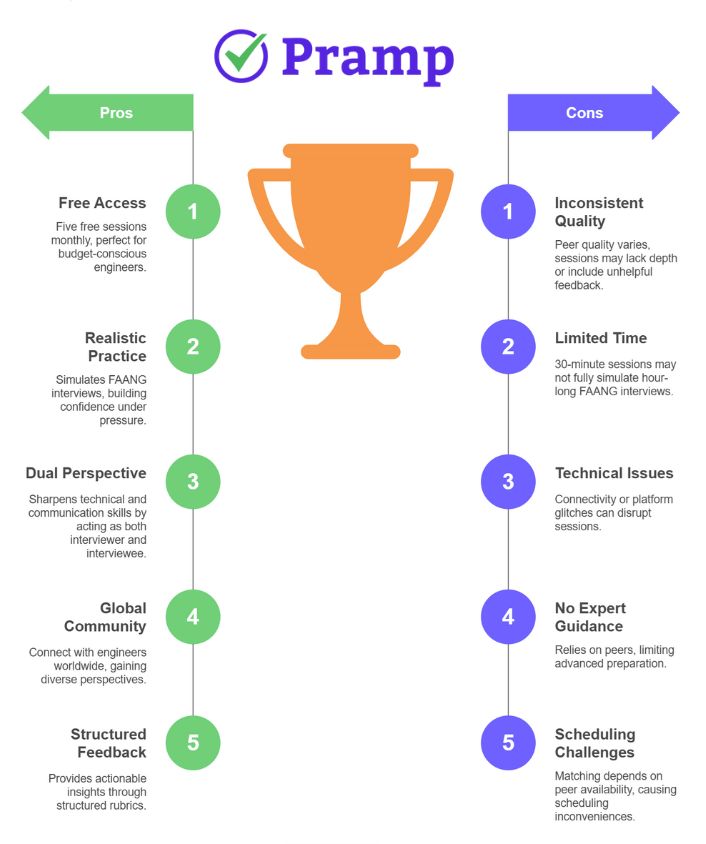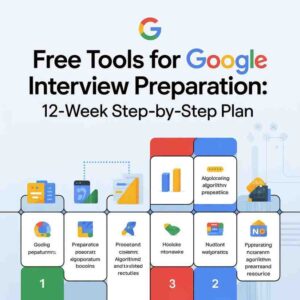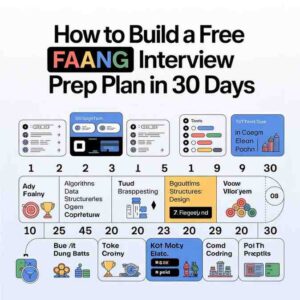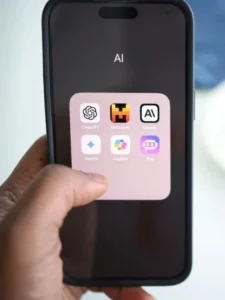Table of Contents
- What Is Pramp and Why Should Software Engineers Care?
- How Free Is It?
- How Pramp Works: A Peer-to-Peer Mock Interview Platform
- Pramp Features for Technical Interview Practice
- Pramp Pros and Cons: What Users Are Saying
- Pramp vs Other Platforms
- Tips to Maximize Your Pramp Experience
- FAQ: Long-Tail Keywords & Common Questions About Pramp
- Conclusion: Is Pramp Worth Your Time in 2025?
Explore our Pramp review to see if this free mock interview platform for software engineers is worth your time. Learn about its features, pros, cons, and more.
Landing a software engineering job at a top tech company like Google or Amazon is no small feat. The interview process is intense, testing your coding skills, system design expertise, and ability to shine in behavioral interviews. Enter Pramp, a free mock interview platform for software engineers that promises to help you practice and polish your skills through peer-to-peer sessions. But is it worth your time in 2025? In this Pramp review, we’ll dive deep into its features, weigh the Pramp pros and cons, and explore whether it’s the right tool for your FAANG interview prep.
With over 2 million job applications flooding FAANG companies annually (Glassdoor, 2023), preparation is everything. Let’s break down how Pramp mock interview platform works, share real user experiences, and offer actionable tips to maximize its value. Whether you’re a bootcamp grad or a seasoned engineer, this guide will help you decide if Pramp Exponent Practice is your ticket to acing that dream interview.
What Is Pramp and Why Should Software Engineers Care?
Pramp, short for “Practice Makes Perfect,” is a free mock interview platform for software engineers designed to simulate real-world technical interviews. Acquired by Exponent in 2021, Pramp pairs users with peers for peer-to-peer coding interview practice, system design, and behavioral interviews. Its unique approach allows you to alternate between interviewer and interviewee roles, offering a dual perspective on the interview process.
Why does this matter? According to a 2024 LeetCode survey, candidates who practiced mock interviews were 60% more likely to pass FAANG coding interviews. Pramp’s free, interactive sessions make it accessible for engineers at all levels, from fresh graduates to senior developers. But does it live up to the hype? Let’s explore its pricing model and features.
How Free Is It?
One of Pramp’s biggest draws is its cost—or lack thereof. Pramp offers five free mock interview credits per month, allowing you to schedule up to five 60-minute sessions without spending a dime. Each credit covers one peer-to-peer session, where you practice coding, system design, or behavioral questions with another engineer.
Want more than five sessions? You’ll need to upgrade to a paid Exponent subscription for unlimited mock interviews. The subscription also unlocks additional features like AI-driven feedback and priority scheduling. While the free tier is generous for beginners, serious candidates preparing for FAANG interviews may find the five-session limit restrictive and opt for the paid plan to maximize practice.
Pro Tip: Earn extra free credits by providing high-quality feedback to peers, which can stretch your monthly allowance further.
How Pramp Works: A Peer-to-Peer Mock Interview Platform
Pramp’s core strength lies in its peer-to-peer coding interview practice model. Here’s a step-by-step look at how it operates:
- Sign Up and Profile Setup: Create a free account on Pramp (now integrated with Exponent Practice). Input your experience level, preferred programming languages, and practice goals (e.g., coding, system design, or behavioral interviews).
- Scheduling: Choose a time slot for your 60-minute session. Pramp’s automatic matching system pairs you with a peer of similar skill level and goals.
- Mock Interview Session: Each session is bi-directional. You spend 30 minutes as the interviewee solving a problem (e.g., a coding challenge or system design question) and 30 minutes as the interviewer. Pramp provides questions, hints, test cases, and a shared code editor.
- Feedback: After the session, you and your peer exchange feedback using Pramp’s structured rubrics, covering technical accuracy, communication, and problem-solving.
Case Study: Maria, a bootcamp graduate, used Pramp to prepare for her Meta interview. After 12 sessions, she improved her ability to explain code under pressure, landing an offer as a junior software engineer. She credits Pramp’s realistic environment for her success.
Statistic: A 2023 Interviewing.io study found that candidates who verbalized their thought process during mock interviews scored 25% higher in real FAANG interviews.
Pramp Features for Technical Interview Practice
Pramp offers a robust set of tools to support live coding interview practice and beyond. Here’s what you get:
- Realistic Interview Environment: Video chat, shared code editor, and timed challenges mimic FAANG interview conditions.
- Diverse Question Types: Practice coding (data structures, algorithms), system design (e.g., designing Twitter), and behavioral interview practice online.
- Peer-to-Peer Learning: Gain insights by playing both interviewer and interviewee, enhancing your understanding of what interviewers look for.
- Structured Feedback: Receive detailed, rubric-based feedback on code quality, communication, and problem-solving via Pramp’s interview feedback system.
- Free Credits System: Start with 5 free credits monthly (each credit = one session). Earn more by receiving positive feedback or upgrading to a paid Exponent subscription.
- Flexible Scheduling: Book sessions at your convenience or join drop dropping interviews.
Pramp Pros and Cons: What Users Are Saying
To give you a balanced Pramp mock interview platform review, let’s look at real user feedback from 2025 sources, including Reddit, Medium, and tech blogs.
Pros
- Free Access: Pramp provides five free sessions monthly, ideal for budget-conscious engineers.
- Realistic Practice: The live, interactive format simulates FAANG interviews, helping you build confidence under pressure.
- Dual Perspective: Acting as both interviewer and interviewee sharpens your technical and communication skills.
- Global Community: Connect with engineers worldwide, offering diverse perspectives and problem-solving approaches.
- Structured Feedback: Pramp’s rubrics provide actionable insights, unlike solo practice on coding platforms.
User Story: On Reddit, a user shared, “Pramp helped me nail my Bloomberg offer. The face-to-face practice forced me to explain my code clearly, which was a game-changer.”
Cons
- Inconsistent Peer Quality: Since peers are not professional interviewers, some sessions may lack depth or include unhelpful feedback. One Reddit user described a session where their peer was distracted by a work call.
- Limited Session Time: 30-minute sessions may not fully simulate hour-long FAANG interviews.
- Technical Issues: Some users report connectivity or platform glitches, which can disrupt sessions.
- No Expert Guidance: Pramp relies on peers, not mentors, which may limit advanced preparation.
- Scheduling Challenges: Matching depends on peer availability, which can be inconvenient for tight schedules.
Statistic: A 2025 Medium post noted that 30% of Pramp users experienced at least one session with technical issues or unengaged peers.
Actionable Tip: If you encounter a subpar session, provide constructive feedback and reschedule. Pramp offers free credits for disrupted sessions to ensure fairness.

Pramp vs Other Platforms
How does Pramp Exponent Practice compare to other mock interview platforms? While a detailed comparison deserves its own blog, here’s a high-level look at how Pramp stacks up against other free and paid options for technical interview prep:
| Platform Type | Key Features | Cost | Best For |
|---|---|---|---|
| Pramp Exponent Practice | Peer-to-peer mock interviews, coding, system design, behavioral practice, free credits | Free (5 credits/month); paid for unlimited | Budget-conscious engineers seeking realistic practice |
| Other Free Platforms | Coding challenges, automated feedback, some live mock interviews | Free; premium options available | Solo practice or early-stage prep |
| Paid Platforms | Expert-led mock interviews, personalized coaching, advanced feedback | $100–$500+ | Candidates seeking professional guidance for FAANG interviews |
Key Differences:
- Free vs Paid: Pramp’s free tier is robust, offering five sessions monthly, while other free platforms may focus more on solo coding practice. Paid platforms provide expert mentors, which Pramp lacks.
- Peer-to-Peer Model: Pramp’s unique strength is its peer-based system, fostering collaboration but risking inconsistent quality. Other platforms may prioritize automated or professional feedback.
- Focus Areas: Pramp covers coding, system design, and behavioral interviews, while some free platforms focus solely on coding, and paid platforms offer comprehensive prep.
User Insight: A 2025 tech blog noted that Pramp excels for early-stage prep but may need supplementation with expert-led platforms for advanced FAANG interviews.
Trend: In 2025, hybrid prep strategies—combining free peer-to-peer platforms with paid coaching—are gaining popularity among FAANG candidates.
Pro Tip: Use Pramp for regular practice and consider paid platforms for final-stage prep to ensure well-rounded preparation.
Tips to Maximize Your Pramp Experience
To make the most of Pramp for FAANG interview prep, follow these actionable strategies:
- Prepare Before Sessions: Review common FAANG questions (e.g., “Two Sum” or “Design Twitter”) on coding platforms or system design resources to build a strong foundation.
- Set Clear Goals: Specify your focus (e.g., algorithms or system design) when scheduling to ensure relevant practice.
- Practice Communication: Verbalize your thought process during coding, as FAANG interviewers prioritize clarity. Record sessions to review your delivery.
- Leverage Feedback: Use Pramp’s rubrics to identify weaknesses (e.g., time management) and address them in subsequent sessions.
- Earn More Credits: Provide high-quality feedback to peers to earn additional free credits for more sessions.
- Supplement with Resources: Pair Pramp with free YouTube tutorials (e.g., system design channels) or online handbooks for deeper learning.
Example: John, a mid-level engineer, used Pramp’s feedback to improve his system design explanations. After 10 sessions, he confidently designed a scalable messaging app during his Amazon interview.
FAQs
What Is Pramp and How Does It Work for Software Engineers?
Pramp is a free, peer-to-peer platform that pairs software engineers for live mock interviews, covering coding, system design, and behavioral questions. You alternate roles, using a shared code editor and video chat.
What Types of Interviews Can You Practice on Pramp?
You can practice:
- Coding (data structures, algorithms).
- System design (e.g., designing scalable systems).
- Behavioral interviews (e.g., leadership, teamwork).
What Are the Pros and Cons of Using Pramp for Interview Preparation?
Pros: Free, realistic practice, dual perspective, global community, structured feedback.
Cons: Inconsistent peer quality, short sessions, occasional technical issues.
What Features Does Pramp Offer for Technical Interview Practice?
Features include video chat, shared code editor, question database, hints, test cases, and rubric-based feedback.
How Does Pramp Match You with Peers for Mock Interviews?
Pramp’s algorithm matches you based on skill level, availability, and practice goals, ensuring relevant pairings.
How Do You Schedule and Conduct a Mock Interview Session on Pramp?
Sign up, select a time slot, and join a 60-minute session via video chat. Alternate between interviewer and interviewee roles, using provided questions and tools.
How Can You Get Feedback After a Pramp Mock Interview?
Peers provide rubric-based feedback on code, communication, and problem-solving. Exponent’s AI also offers automated feedback for some sessions.
How to Maximize Your Free Credits on Pramp for Interview Prep?
Earn extra credits by giving high-quality feedback or upgrade to Exponent’s paid plan for unlimited mock interviews.
Is Pramp Really Free for Mock Interviews?
Yes, Pramp offers five free credits monthly. Unlimited sessions require an Exponent subscription.
Can Pramp Help You Prepare for FAANG Software Engineer Interviews?
Pramp is effective for early-stage prep but may need supplementation with expert-led platforms for advanced FAANG interviews.
Should You Choose Pramp or Another Platform for Technical Interview Practice?
Choose Pramp for free, peer-based practice. Opt for paid platforms for expert guidance if needed.
Are Pramp Mock Interviews Effective for Improving Coding and Behavioral Skills?
Yes, they improve communication and technical skills, but effectiveness depends on peer quality and your preparation.
Conclusion: Is Pramp Worth Your Time in 2025?
Pramp Exponent Practice is a solid choice for software engineers seeking free mock interview platforms for software engineers. Its peer-to-peer model, realistic environment, and structured feedback make it a valuable tool for building confidence and sharpening skills. However, inconsistent peer quality and limited session length mean it’s best used as part of a broader prep strategy, alongside other coding or coaching platforms.
























